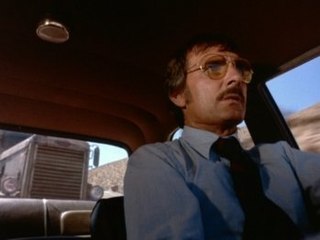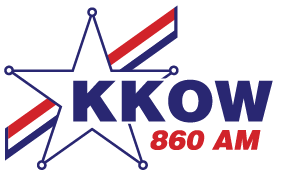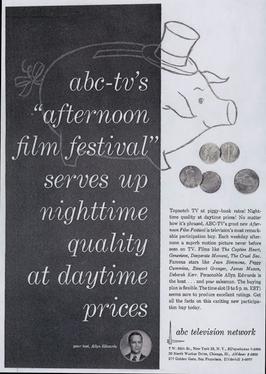Prime-time, or peak-time, is the block of broadcast programming taking place during the middle of the evening for television shows. It is mostly targeted towards adults. It is used by the major television networks to broadcast their season's nightly programming. The term prime-time is often defined in terms of a fixed time period—for example, from 8:00 p.m. to 11:00 p.m. or 7:00 p.m. to 10:00 p.m.. In India and some Middle Eastern countries, prime time consists of programmes that are aired on television between 8:00 p.m. and 10:00 p.m. local time.

Kids' WB was an American children's programming block that originally aired on The WB from September 9, 1995, to September 16, 2006, and later on The CW from September 23, 2006, to May 17, 2008. Initially launched as a competitor to Fox Kids, Kids' WB aired primarily during the Saturday morning and weekday after-school time slots, although airtimes for the block's programming varied at the local affiliate's discretion.

Fox Kids was an American children's programming block and branding for a slate of international children's television channels. Originally a joint venture between the Fox Broadcasting Company (Fox) and its affiliated stations, it was later owned by Fox Family Worldwide.
In broadcast programming, dayparting is the practice of dividing the broadcast day into several parts, in which a different type of radio programming or television show appropriate for that time period is aired. Television programs are most often geared toward a particular demography, and what the target audience typically engages in at that time.

The ABC Sunday Night Movie is a television program that aired on Sunday nights, first for a brief time in 1962 under the title Hollywood Special to supposedly replace an open time slot for the TV show Bus Stop, which was cancelled after March 1962. It then began airing regularly under its more commonly known title from late 1964 to 1998, on ABC. Since 2004, it has aired sporadically as a special program, now titled the ABC Sunday Movie of the Week, though as of the 2011-12 television season, the only films in this timeslot were aired under the Hallmark Hall of Fame banner, which transferred to ABC in that season. However, in 2014, The Hallmark Hall of Fame moved exclusively to cable on the Hallmark Channel. As a result of this, the Sunday Night Movie is now exclusively relegated to two special holiday movies, The Sound of Music every holiday season and The Ten Commandments every Easter.
Christmas themes have long been an inspiration to artists and writers. A prominent aspect of Christian media, the topic first appeared in literature and in music. Filmmakers have picked up on this wealth of material, with both adaptations of Christmas novels, in the forms of Christmas films, Santa Claus films, and Christmas television specials.

News broadcasting is the medium of broadcasting various news events and other information via television, radio, or the internet in the field of broadcast journalism. The content is usually either produced locally in a radio studio or television studio newsroom, or by a broadcast network. A news broadcast may include material such as sports coverage, weather forecasts, traffic reports, political commentary, expert opinions, editorial content, and other material that the broadcaster feels is relevant to their audience. An individual news program is typically reported in a series of individual stories that are presented by one or more anchors. A frequent inclusion is live or recorded interviews by field reporters.
Late night television is the general term for television programs produced for broadcast during the late evening and overnight hours—most commonly shown after, if not in competition with, local late-evening newscasts; programs that have been showcased in the daypart historically encompassed a particular genre of programming that falls somewhere between a variety show and a talk show. Late-night shows predominantly cater to night owls, people suffering from insomnia, shift workers with irregular schedule assignments, younger male audiences and college students, along with spillover audiences through viewers of entertainment and news programs aired earlier in the evening.

WHBQ-TV is a television station in Memphis, Tennessee, United States, affiliated with the Fox network and owned by Imagicomm Communications. The station's studios are located on South Highland Street in East Memphis, and its transmitter is located on Raleigh-LaGrange Road on the city's northeast side.

KMBC-TV is a television station in Kansas City, Missouri, United States, affiliated with ABC. It is owned by Hearst Television alongside CW affiliate KCWE. The two stations share studios on Winchester Avenue in the Ridge-Winchester section of Kansas City, Missouri; KMBC-TV's transmitter is located in the city's Blue Valley section.
A weekday cartoon is the colloquial term for the animated series programming that was typically scheduled on weekday mornings and afternoons in the United States on many major television networks and in broadcast syndication since the 1960s.

Daytime television is the general term for television programs produced for broadcast during the daytime hours on weekdays; programs broadcast in the daypart historically have been programmed to appeal to a female audience.

The ABC Movie of the Week was an American weekly television anthology series featuring made-for-TV movies that aired on the ABC network in various permutations from 1969 to 1975.

KKOW is a AM radio station in Pittsburg, Kansas. It broadcasts a farm–classic country format.
A graveyard slot is a time period in which a television audience is very small compared to other times of the day, and therefore broadcast programming is considered far less important. Graveyard slots are usually situated in the early morning hours of each day, when most people are asleep.
The 4:30 Movie is a television program that aired weekday afternoons on WABC-TV in New York from 1968 to 1981. The program was mainly known for individual theme weeks devoted to theatrical feature films or made-for-TV movies starring a certain actor or actress, or to a particular genre, or to films that spawned sequels. The more popular episodes were "Monster Week," "Planet of the Apes Week" and "Vincent Price Week." Some films, such as Ben-Hur and How the West Was Won, were of such length that an entire week was devoted to running the whole movie. Other films that ran longer than the program's 90-minute length were often divided into two parts and shown over two days.
American cable and satellite television network Freeform was originally launched as the CBN Satellite Service on April 29, 1977, and has gone through four different owners and six different name changes during its history. This article details the network's existence from its founding by the Christian Broadcasting Network to its current ownership by The Walt Disney Company, which renamed the network to Freeform on January 12, 2016.

This TV was an American free-to-air television network owned by Allen Media Broadcast Networks, LLC, part of the Allen Media Group division of Entertainment Studios. Originally formed in 2008 as a joint venture between Metro-Goldwyn-Mayer and Weigel Broadcasting, the network carried various unscripted series from Entertainment Studios' library. The network previously had a large programming emphasis on films, primarily sourced from the library of former owner MGM, but all films were dropped from the schedule in 2024. Classic television series and children's programming had also aired on the network previously. The network quietly closed on May 31, 2024, with the website eventually being shuttered July 13.
NBC Saturday Night at the Movies was the first television show to broadcast in color relatively recent feature films from major studios. The series premiered on September 23, 1961, and ran until October 1978, spawning many imitators. Television stations had previously only been able to show older, low-budget, black-and-white films. In the late 1970s, competition from cable television and home video led to a decline in viewership.

Afternoon Film Festival was a series of British theatrical feature-films aired by the American Broadcasting Company (ABC) television network from January 1956 through the summer of 1957 each weekday from 3:00 to 5:00 pm (EST). This anthology was the first instance of a major over-the-air (non-cable) American television network broadcasting a package of theatrical movies as part of its Monday-through-Friday daytime television programming. Consisting mostly of films from the 1940s and early 1950s, Afternoon Film Festival was actually an offshoot from ABC's prime-time movie series Famous Film Festival, which began in the fall of 1955 on Sunday evenings and featured a package of 35 British titles leased from J. Arthur Rank Film Distributors in England at a cost of $45,700 each.










